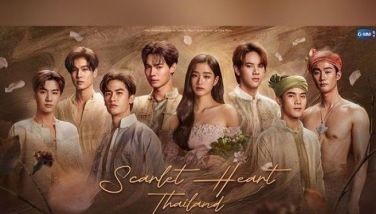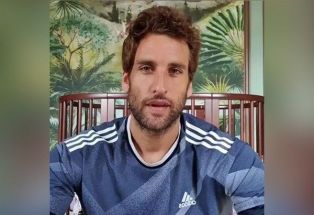The songs The Beatles wrote but gave away
“Songwriting is a thing we can’t stop — it’s a habit, almost.” — Paul McCartney
MANILA, Philippines - Years before Beatlemania became a household word in Britain, The Beatles were covering songs written and performed by their rock heroes and influences. John Lennon and Paul McCartney knew instinctively well though they could write their own materials. And so they did, first, with difficulty and, later, with fluidity from the late ‘50s. By the mid-‘60s, the Lennon-McCartney writing partnership became already a legend and helped establish the musical careers of other British acts.
Paul was always a source of challenge to John. When Paul met John in 1957 and played Twenty Flight Rock, John thought twice in recruiting Paul to the group seeing a competitor in him, whose much-advanced guitar playing was unsettling. But John dismissed this fear and saw the bigger picture with Paul in the group as an additional asset.
Another source of insecurity for John surfaced when Paul played him some of his own compositions. The first song Paul composed when he was 14 (in 1956) was I Lost My Little Girl, which officially surfaced and was given proper introduction by Paul himself in his Official Unplugged album in the mid-‘90s.
In no time, John embarked on his own project, which produced Hello Little Girl (1957), his first-ever complete composition. This creative competition will last even beyond The Beatles’ breakup, but throughout almost the career of the group, John and Paul preferred mutual cooperation. Paul claimed they never extended beyond three hours working on a song and recalled no instance when they sat down and produced no new material.
What Paul loved most about John was how John suggested alternative lyrics to his own. In a TV special in 1986, he talked fondly about this partnership with BBC’s Richard Skinner. I Saw Her Standing There was a case in point. The original first verse had the following opening lines — “Well, she was just seventeen, never been a beauty queen,” which John immediately vetoed and replaced the second phrase with the more insinuative “…and you know what I mean.”
In 1968, Paul wrote Hey Jude, this time all by himself. The Beatles had by then increasingly become individual artists, each of them nurturing different creative pursuits. Paul recalled intimating to John his plan to alter the line in the song’s refrain “…the movement you need is on your shoulder…,” thinking it meant nothing. John immediately assured Paul that was the best line of the song.
One wonders about the artists John and Paul benefited with their songwriting gift. Brian Epstein, the famed manager of the group, secured a steady supply of songs for the other artists under his management and relied primarily on the Lennon-McCartney writing team for potential singles. Billy J. Kramer is one foremost recipient. He recorded Do You Want to Know a Secret? which went to No. 2 in the British singles chart and a host of other Lennon-McCartney compositions: From a Window, I’m In Love, I’ll Be On My Way and I’ll Keep You Satisfied. John’s composition Bad to Me went to No. 1 in the UK charts. These songs earned him international fame and a favorable place in British pop music history.
John introduced Cilla Black to Brian and helped build her musical career with Lennon-McCartney compositions. Cilla remembers Paul approaching once in those early days and offered her the song. Love of the Loved. She protested knowing the song was already dated as The Beatles were singing it back then in Hamburg. She recorded it anyway as her debut single, which peaked modestly at No. 35 in the British charts. Following two chart-topping singles not written by The Beatles, Anyone Who Had a Heart and You’re My World, Cilla recorded another Lennon-McCartney original It’s For You, which enjoyed similar success and worldwide fame. Paul gave her Step Inside Love in 1968 that guaranteed her another chart hit. In between these periods, Cilla recorded covers of other Beatles songs.
Another Liverpool group called The Fourmost enjoyed access to the early Lennon-McCartney materials, which gave it modest success in Britain. The group recorded John’s first compositions Hello Little Girl and I’m In Love, which reached No. 17.
The biggest hit makers though were Peter and Gordon. Paul wrote for them A World Without Love, a chart-topping single in both the US and Britain. Other Paul-penned materials the duo recorded included Nobody I Know, I Don’t Want To See You Again and Woman. The preferential treatment from Paul was most likely on the account of Peter Asher being the brother of Paul’s then theater-artist girlfriend Jane Asher.
Most of these songs remained unrecorded by The Beatles themselves, but some came officially out in The Anthology, specifically the highly in-demand Decca audition repertoire where the Fab Four were turned down in the New Year’s eve of 1963.
The Rolling Stones got a boost in their career when The Beatles gave them a single with the Lennon-McCartney byline. One afternoon in 1963, Mick Jagger and Keith Richard, on the way to the studio, met John and Paul and asked the writing partners if they had any song for them. Entering the studio, John and Paul asked for some time to finish off a song they were working on. After a few minutes, both emerged from one corner of a room and played the Stones’ I Wanna Be Your Man, which the Stones recorded and released as their next single.
This incident was monumental for the Stones because John and Paul inspired the then-would-be The Glimmer Twins to write most of their materials from then on.
Not everyone The Beatles offered their songs to would record the Lennon-McCartney pieces. Paul, who fancied writing for Frank Sinatra, came up in the early days with Suicide, which he offered to the Chairman of the Board in the mid-‘70s. Sinatra declined probably for the same reason Paul refused to include it in his first solo album.
Much earlier on, John offered Helen Shapiro, a budding star in the early ‘60s for whom The Beatles fronted, the song Misery, which appeared in The Beatles’ maiden album, but her management turned down the offer probably seeing the song’s mismatch with her public persona and song style.
In the same way, Billy J. Kramer revealed missing out on a big opportunity when he turned down a song written by Paul. It was 1965 when, after several years, Billy again met Paul and asked him if he had any song for him. Paul played him Yesterday, but he did not dig it. Three decades later, Ray Coleman, author of the monumental Lennon biography, devoted a whole book to this most popular song of all time.
The Beatles slowed down in giving songs away when their songwriting departed from the usual dose of “poppy stuff” that typified their early classic compositions. Besides, by the mid-‘60s, most of the artists under Brian, the one egging John and Paul on to produce chart hits for these artists, had already peaked in their careers. And, by this time, artists were already covering Beatles songs as they pleased: From Ella Fitzgerald and Petula Clark to The Supremes and The Mamas and the Papas; and from The Beach Boys, Kingston Trio and The Four Tops to Ray Charles, Otis Redding and Jose Feliciano.
Meanwhile, John, Paul, George and Ringo had reached the summit of their popularity, sealed by the record-breaking audience that invaded Shea Stadium in the Summer of ’65, which ushered in what is now known as stadium rock.
Exposed to the music of Bob Dylan and folk artists that headlined the cultural wagon of the civil rights and anti-war movements in this period, The Beatles consciously left their comfort zone where they had nothing left to further prove anyway and helped write the soundtrack of this emerging counter culture. John took to introspection with In My Life and Nowhere Man and pursued Paul started experimentations with tape loops in Tomorrow Never Knows. For his part, Paul reflected about alienation in Eleanor Rigby, while George reserved acerbic remarks about taxation in Britain with Taxman and fused his interest in Eastern religion with the band’s music. All these efforts would peak with The Beatles going psychedelic in full regalia in Sgt. Pepper and Magical Mystery Tour. The back-to-basics approach by the group to the double-disc White Album seemed to signal, however, The Beatles’ renewed benevolence toward other artists.
It was also Brian’s departure, ironically, that drew The Beatles back to cooperation with other artists. In 1968, the group took over the management of their business and started Apple — a concept born straight from the anti-establishment venture that sought to level the playing field for artists who have the talent. The Beatles soon signed up artists including James Taylor, The Iveys, which evolved to Badfinger, Jackie Lomax, and Mary Hopkins of Those Were the Days fame.
Paul wrote Come and Get It for the Badfinger and Goodbye for Mary Hopkins. Towards the close of the ‘60s, Paul remembered writing a song in most unusual circumstances. In a BBC Radio program broadcast last November, he recalled taking a break in Portugal, which brought him one night to the bar of a famous golf club. Admitting not being in full possession of his senses, Paul remembered taking over a drum kit and singing about the name of the club oblivious to the crowd around him. Someone must have recorded this session, because Paul later received a phone call asking for permission to record the song La Penina. It was rush-recorded in 1969 by a local artist Carlos Mendez.
George, by this time a full-fledged songwriter himself, gave Sour Milk Sea to Jackie Lomax, where Paul also played bass, Ringo drums, and Eric Clapton guitars.
Apart from writing songs for their Apple recruits, George also co-wrote Badge with Eric for the farewell album of one of the best blues-rock trios in history, the Cream. George recalled Eric already figured out the chords so he just started scribbling lyrics on a sheet of paper facing Eric. Following the first verses, George wrote “bridge” to indicate the middle part of the song. In front of him, Eric looked at what George was writing upside down and asked “What’s that badge?” George laughed and Eric took that as the title of the song.
Conspicuously absent in the scene was John who was busy in his newfound world with Yoko Ono producing experimental solo albums such as the series Unfinished Music No. 1 — The Two Virgins, Unfinished Music No. 2 — Life with the Lions and The Wedding Album, and recording concert album Live Peace in Toronto featuring Eric, Klaus Voorman and Yoko.
He would write a song though for Dr. Timothy Leary, the reputed LSD guru, who approached him for a campaign song. Dr. Leary elected to run for governor of California in 1968. John wrote Come Together but opted to record it himself when the candidate did not come back to claim his song.
Despite the acrimonious breakup of The Beatles, the four remained personal friends. John, Paul and George continued writing songs for another artist, but this time it’s Ringo himself. In the drummer’s self-titled album in 1973, John, Paul and George all wrote for the album. It was actually the closest to a Beatles reunion that could happen, wrote the music critics correctly enough. John penned his semi-autobiographical song I’m The Greatest for Ringo to sing, Paul gave Six O’ Clock, while George collaborated with Ringo in Photograph and wrote two more songs for the album — Sunshine Life For Me (Sail Away Raymond) and You and Me (Babe) co-written with one of the Fifth Beatles, Mal Evans, a buddy closest to The Beatles.
The following year in 1974, Ringo would release Goodnight Vienna, his fourth album. John wrote the title track and rearranged Only You, The Platters’ big 1950s hit, for Ringo. Two years later, Ringo would release Ringo’s Rotogravure where he would see the other three Beatles chipping in again.
Even in the ebb of Ringo’s musical career, John, Paul and George were there for Ringo. In his 1981 release Stop and Smell the Roses, he approached his former band mates. Paul, coming on the heels of the success of McCartney II that yielded the No. 1 hit single Coming Up, gave him two songs, Attention and Private Property, and produced a remake of Carl Perkins’ Sure to Fall, part of the early repertoire of The Beatles. George, busy with his own album Somewhere in New England, made a demonstration of Wrack My Brain for Ringo to perform. Interestingly, Ringo approached John, who had then recently reemerged from retirement with a new album Double Fantasy and readily gifted him with two songs: Nobody Told Me and Life Begins at 40. Both agreed to record on Jan. 14, 1981. But before this programmed recording session could happen more than a month prior, John would be murdered.
Meanwhile, Paul supported his brother’s (Mike McGear) musical career all the way in the early ‘70s. Paul co-wrote most of the singles Mike released and gave away a song for Mike’s album Woman (1972) and co-wrote most of the materials in McGear (1974).
John did collaborate with several artists in the early ‘70s. David Bowie had his first taste of a chart-topping single in the US with Fame, co-written with John, from the Young Americans album. During his long lost weekend, an 18-month separation from Yoko, John managed, albeit in the least ideal circumstances, to produce Harry Nilsson’s album, Pussy Cats, to which John contributed Mucho Mungo.
Much earlier, he gave God Save Us to Bill Elliott/Elastic Oz, and Rock and Roll People went to blues maestro Johnny Winter for his album John Dawson Winter III.
George demonstrated generosity throughout his solo career as well. In 1970, he helped Billy Preston in his album Encouraging Words and co-wrote for him You Give Me Joy and with Ringo, Gonna Get My Baby. Ronnie Spector got from George Try Some Buy Some for his single in 1971, which George also included in his 1972 album Living in the Material World, and Tandoori Chicken for the B-side of her other single a year later. George in 1972 co-wrote The Hold Up with David Bromberg. In 1973, Alvin Lee, front man of the renowned Ten Years After, recorded the song So Sad, which later also appeared in George’s album Dark Horse.
By the mid-‘80s, George would contribute two songs, Celebration and Focus of Attention, both co-written with Jimmy Helms, to the soundtrack of the film Water. In 1989, George wrote Run So Far for Eric’s album The Journeyman. George’s version of the song posthumously came out in 2002 in the album Brainwashed. Aside from helping out on the production side of Gary Moore’s album Still Got the Blues, George gave him That Kind of Woman to be included in this highly successful 1990 album.
Ringo also contributed his songwriting talent to some artists aside from Billy Preston. He co-wrote How Long Can Disco On with Harry Nilsson in 1980 for the latter’s album Flash Harry. And in 1976, he gave Band of Steel, his own composition, for Guthrie Thomas’ Lies and Alibis.
Paul proved generous as well with his songwriting. In 1974, he wrote Fourth of July for John Christie, Mine for Me for Rod Stewart’s Smiler, and Let’s Love for Peggy Lee, probably his way of thanking her for the song Till There Was You. In 1977, Roger Daltrey, The Who’s front man, recorded Giddy for his album One of the Boys. Denny Laine co-wrote with Paul Send Me the Heart for his post-Wings album Japanese Tears.
Further on in the ‘80s, Paul would write On the Wings of a Nightingale for The Everly Brothers, John and Paul’s model for vocal harmony, for the duo’s compilation with Mercury. He would also give soundtrack composer John Williams The Honorary Consul in 1983 for the film adaptation of a Graham Greene’s book of the same title and co-wrote with country legend Johnny Cash in 1988 the song New Moon Over Jamaica for the Cash album Water from the Wells Of Home.
Throughout their musical career, The Beatles contributed willingly their songwriting talent to other artists who needed it. It served as an accessible means for them to collaborate and nurture friendship with other artists belying the common perception that The Beatles were an exclusive group. Indeed, The Beatles interested themselves in other artists’ music and, whenever time allowed, made music with them — a blend of great musicianship and generosity the Fab Four personified.
- Latest
- Trending































